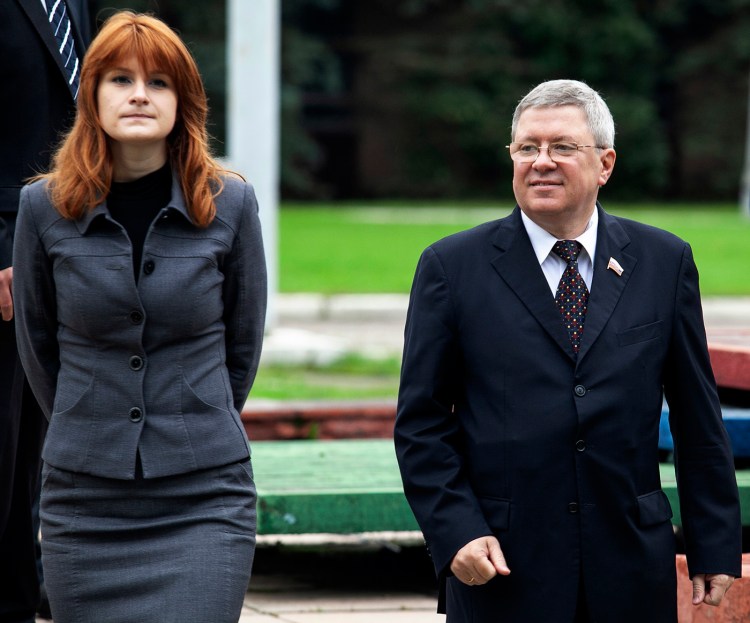Russian gun rights activist Maria Butina was sentenced to an 18-month prison term Friday in Washington after failing to register as a foreign agent for conspiring to infiltrate conservative U.S. political circles for the Kremlin.

Maria Butina Alexandria Detention Center
Butina, 30, pleaded guilty in December to conspiring with a senior Russian official to access the National Rifle Association among other groups from 2015 until she was arrested and detained in July. She will be credited for the more than nine months she already has served.
U.S. District Judge Tanya S. Chutkan also granted a request to deport Butina to Russian after her prison term ends.
Butina was the first Russian national convicted of seeking to influence American policy in the run-up to the 2016 election, though her case was handled by the U.S. attorney’s office for the District of Columbia and the Justice Department’s national security division, not by special counsel Robert S. Mueller III.
Butina admitted to working as an undeclared agent of a foreign government, but she did not admit and was not charged with espionage in federal court proceedings.
Her defense attorneys had accused U.S. prosecutors of “sandbagging” her with last-minute espionage allegations in asking Chutkan for the 18-month prison term.
In her plea papers, Butina said she worked under the direction of Alexander Torshin, a former Russian government official, and with an American political operative on a multiyear scheme to establish unofficial lines of communications with Americans who could influence U.S. politics.
Butina was motivated by good intentions of improving political relations between the countries, her attorneys, Robert N. Driscoll and Alfred D. Carry, wrote in a sentencing request April 19, adding that she was remorseful and “has done everything she could to atone for her mistakes through cooperation and substantial assistance.”
The defense team asked Chutkan to toss out expert testimony prosecutors filed to bolster their 18-month sentencing request. The statement relied heavily on a former FBI official’s opinion that Butina’s effort to infiltrate conservative groups bore “all the hallmarks” of an intelligence operation to target powerful political individuals for Kremlin recruitment later.
Chutkan declined to eliminate the testimony but had asked the defense team if it wished to delay sentencing to have a chance to find its own expert to rebut the government.
Butina’s attorneys responded in a court a filing that they wanted the testimony thrown out, not a delay.
Even though Butina was not a traditional spy or a trained intelligence officer, “The value of this information to the Russian Federation is immense,” wrote Assistant U.S. Attorney Erik M. Kenerson, the lead prosecutor. He added, “Such operations can cause great damage to our national security by giving covert agents access to our country and powerful individuals who can influence its direction.”
Driscoll and Carry called prosecutors’ “newly-minted theory of the case,” nothing more than “speculation and supposition,” lacking evidence that anyone Butina met with was approached by Russian intelligence using information she provided.
Butina was not “a spy in any sense. The government knows that,” her attorneys said.
Butina’s plan, which she called the “Diplomacy Project,” targeted the conservative movement, and gun rights groups in particular, as a way to reach the Republican winner of the 2016 election, who she correctly predicted would be Donald Trump, court filings show.
Butina laid out the proposal in March 2015. Over the next two years, citing the NRA’s influence on the Republican Party, she traveled to conferences to associate with Republican presidential candidates, hosted “friendship dinners” with wealthy Americans and organized a Russian delegation to attend the influential National Prayer Breakfast in Washington.
She gained access to these groups by founding a gun rights group in Russia and serving as an interpreter for Torshin, a lifetime NRA member and a former Russian senator and deputy governor of the country’s central bank.
Butina and Torshin invited NRA leaders to Moscow in December 2015, with Butina stressing the importance of setting up meetings with top Russian politicians, including a successful gathering with Russian Foreign Minister Sergei Lavrov.
Later, she wrote Torshin that “she had laid the groundwork for an unofficial channel of communication with the next U.S. administration.”
In sentencing papers, Butina’s lawyers said she never received Russian funding and was acting not under orders but out of genuine interest in improving U.S.-Russian relations.
Court documents also indicate Butina worked closely with a Republican Party consultant, with whom she had a romantic relationship after they met when he visited Moscow in 2013. He has been identified by government officials as Paul Erickson, a longtime GOP political adviser from South Dakota who managed the 1992 presidential campaign of Pat Buchanan.
Erickson was indicted in February in South Dakota over what federal prosecutors said was an unrelated investment-fraud scheme. Erickson’s attorney, William Hurd, has said his client is a “good American” who “has never done anything to hurt our country and never would.”
Send questions/comments to the editors.



Comments are no longer available on this story